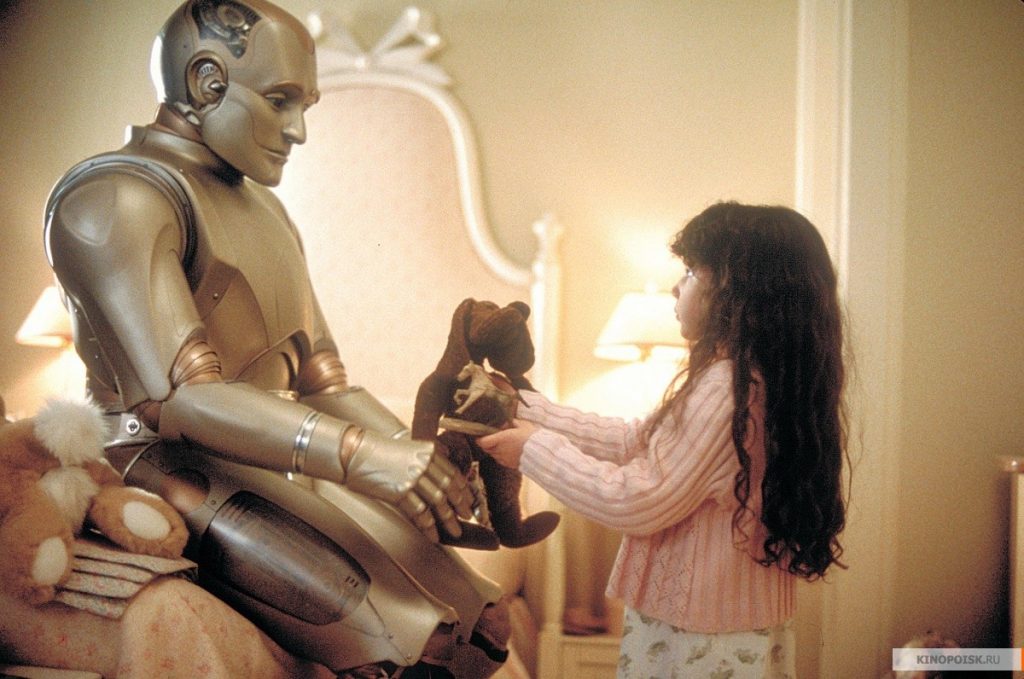Bicentennial Man (1999)

The great science fiction writer, Isaac Asimov, is among my favorite authors, and I have been surprised by the dearth of movie adaptations of his work, especially from someone as prolific, popular and influential. Bicentennial Man represents the first legitimate big-budget adaptation to date, taking its title from Asimov’s masterpiece short story of the same name, but it’s really based on the more recent reworking of that story entitled “The Positronic Man”, Asimov’s third and final collaboration with Robert Silverberg.
Robin Williams plays Andrew, the newly acquired “home appliance” bought by Richard Martin (Neill) to assist in the various chores for his wife and two daughters. Andrew isn’t quite like the other model NDR-114’s, as he frequently exhibits curiosity, as well as a creative side, as evidenced by the wood sculptures and clocks he makes in his “spare time”. Richard fosters Andrew’s need to express himself, making him one of the family, but as Andrew becomes more autonomous, he finds that he is still limited by his status as a robot. As the family grows older and eventually dies, Andrew remains the same, and with newfound freedom, he goes about trying to fulfill his one unwavering wish — to be human.
Bicentennial Man is both entertaining and frustrating at the same time, delivering an amusing, and sometimes a fascinating story, yet it seems content to only scratch the surface of possibilities as laid out in Asimov’s original tale. I suppose the death knell for intelligent sci-fi came when Chris Columbus was hired on to direct, as his penchant for all things melodramatic means that he is going to do everything in a schmaltzy, touchy-feely way, and that moments of intelligent complexity would be jettisoned in favor of soul-searching and hug sessions. This doesn’t make it bad, it just makes it homogenized for easy mass consumption for the mom & pop audiences out there looking to see Columbus and Williams deliver another Mrs. Doubtfire to warm the cockles.
The most laudable aspect of Bicentennial Man is the lavishness of the production, and every penny of the $100 million budget shows. It’s a good looking movie, with excellent sets, costumes, special effects, and futuristic devices, with a clean, bright appearance of a positive looking future. Even more impressive than the quality of the visuals is the fantastic makeup job by the multitudinous artists that were hired to show the effects of aging. This has to be the most convincing looking aging I’ve ever seen in a film, with almost everyone in the cast having to look far older than they are at times, and you never doubt the age for a second.
With the table set for some good science fiction, Columbus doesn’t even try to touch the same bases as Asimov so much as his own Home Alone/Stepmom game. This is a film for the heart, instead of the mind, not trying to explore the fascinating explorations of what it is to be human, so much as what it is to love and be loved. This softball approach is what ultimately will placate audiences in thinking it’s adequate, but in the end, no one will champion it as a great work of art, science fiction, comedy, or drama. It is strictly for entertainment purposes only — consumed and discarded like any other. Asimov’s story might be legendary, but you can bet that 200 years from now, Chris Columbus’ Bicentennial Man won’t be remembered.
Qwipster’s rating: B-
MPAA Rated: PG for language and some sexual content
Running Time: 132 min.
Cast: Robin Williams, Embeth Davidtz, Sam Neill, Oliver Platt, Kiersten Warren, Wendy Crewson, Hallie Kate Eisenberg, Lindze Letherman, Angela Landis
Director: Chris Columbus
Screenplay: Nicholas Kazan (based on the short story by Isaac Asimov and the novel, “The Positronic Man” by Asimov and Robert Silverberg)
